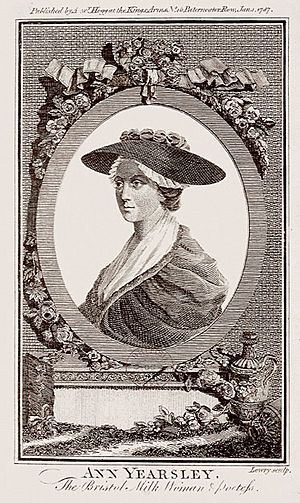Ann Yearsley facts for kids
Quick facts for kids
Ann Yearsley
|
|
|---|---|

Ann Yearsley, 1787
|
|
| Born | 8 July 1753 Bristol, England
|
| Died | 6 May 1806 (aged 52) Melksham, England
|
| Resting place | Clifton, Bristol |
| Nationality | English |
| Other names | Lactilla |
| Occupation | Milkmaid Poet |
| Years active | 1784–1796 |
| Known for | Poetry |
Ann Yearsley (born Ann Cromartie, 8 July 1753 – 6 May 1806) was an English poet and writer. She was also known as Lactilla. Ann came from a working-class family in Bristol, England. She became famous for her poetry, even though she had no formal schooling. The well-known poet Robert Southey later wrote about her life.
Contents
Ann Yearsley's Life Story
Early Life and Challenges
Ann Cromartie was born in Bristol. Her parents were John and Anne Cromartie. From a young age, Ann worked as a milkwoman, just like her mother. She never went to school, but her brother taught her how to read and write.
In 1774, Ann married John Yearsley, who was a farmer. About ten years later, Ann and her family faced very hard times. They were in extreme poverty. Luckily, a kind writer named Hannah More and other people helped them.
Ann Yearsley was also one of the important women in Bristol who spoke out against the Bristol slave trade. This was the buying and selling of enslaved people.
Ann's husband passed away in 1803. She died in 1806 in Melksham, near Trowbridge, Wiltshire. You can find her grave in Birdcage Walk, Clifton, Bristol.
Becoming a Poet
Hannah More was very impressed when she first saw Ann Yearsley's writing. She said Ann's poems "breathed the genuine spirit of poetry." This meant they felt truly poetic. Hannah also noted that the poems showed a strong feeling of sadness.
Hannah More helped Ann publish her first book, Poems, on Several Occasions, in 1785. She organized "subscriptions" for Ann. This meant people paid money in advance to help publish the book. The book was a big success! However, Ann and Hannah had a disagreement. The money from the book was put into a special fund, and they argued about who could use it. Ann even wrote about this disagreement in a later edition of her poems.
After this, Ann Yearsley received support from Frederick Hervey, 4th Earl of Bristol. She then published another book, Poems, on Various Subjects, in 1787.
Her Famous Works
In 1788, Ann Yearsley published a powerful poem called A Poem on the Inhumanity of the Slave-Trade. Many people thought this poem was as good as, or even better than, a similar poem by Hannah More.
Ann also tried writing plays. Her play Earl Goodwin: an Historical Play was performed in 1789 and printed in 1791. She also wrote fiction, like The Royal Captives: a Fragment of Secret History, Copied from an Old Manuscript (1795). Her last collection of poems, The Rural Lyre, came out in 1796.
A Look Back at Her Life
In 1831, the poet Robert Southey wrote a biography about Ann Yearsley. He called it an "introductory essay on the lives and works of our uneducated poets." He meant poets who didn't go to school.
Southey explained that Ann Yearsley learned her writing style, grammar, and spelling from the few books she had read. These included some plays by William Shakespeare, Paradise Lost, and Night-Thoughts. Hannah More said Ann didn't even own a dictionary. She didn't know much about grammar rules. Yet, her language was full of interesting comparisons, vivid pictures, and personification.
Southey said that Ann Yearsley was a writer "gifted with voice." This means she had a strong, unique way of expressing herself.
Ann Yearsley's Books
- Poems, on Several Occasions (1st edition, with a preface by Hannah More, 1785) (Etexts)
- Poems, on Several Occasions (4th edition, with a new preface by Yearsley, 1786)
- Poems, on Various Subjects (1787)
- A Poem on the Inhumanity of the Slave Trade (1788) (Etext)
- Stanzas of Woe (1790)
- Earl Godwin: An Historical Play (performed 1789; printed 1791)
- The Royal Captives: a Fragment of Secret History, Copied from an Old Manuscript (4 vols., 1795)
- The Rural Lyre: a Volume of Poems (1796)
See Also
- List of 18th-century British working-class writers
 | Jewel Prestage |
 | Ella Baker |
 | Fannie Lou Hamer |

